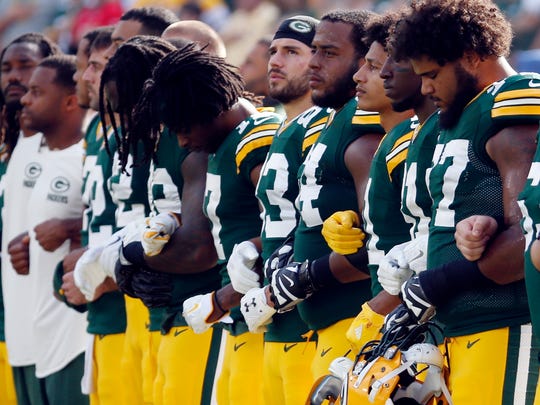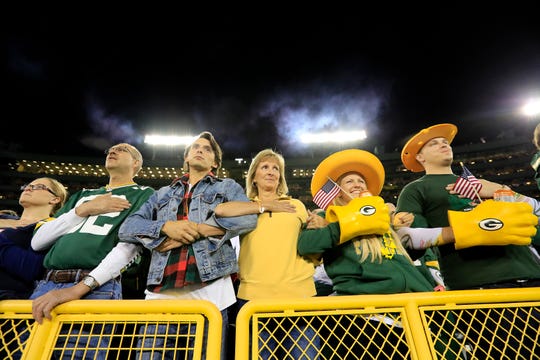Green Bay Packers fans have differing opinions on whether NFL teams should be involved in protesting social justice issues.
Green Bay Press-Gazette
GREEN BAY – Some Green Bay Packers fans say they won’t stand for players who kneel during the national anthem, while others praise the athletes for bringing attention to issues of justice and equality.
The segment of football fans who’ve been unhappy with players kneeling during “The Star-Spangled Banner” ever since San Francisco 49ers quarterback Colin Kaepernick first took a knee in 2016 was further aggravated when the NFL said it would add “Lift Every Voice and Sing,” popularly called the Black national anthem, before all opening games of the 2020 season.
“I think the NFL and the Packers are taking a big misstep in making their product not about the game of football and making it about the political agendas of some of its players,” Andy Duffrin of Marinette said. “The proof is in the pudding and the pudding they are about to serve up is not going to taste very good to a lot of loyal fans.”
To be sure, Packers fans are across the board on the issue, from wholehearted support for Packers and NFL involvement in the social justice movement, to mixed feelings, to outright anger and rejection.
According to a new Washington Post poll, 56% of Americans say it is appropriate for athletes to kneel during the national anthem to protest racial inequality; 42% say it is not appropriate. The poll found 62% of Americans say professional athletes should use their platforms to express their views on national issues, including more than eight in 10 Black Americans and seven in 10 adults under age 50.
“It has been inspiring and instructive in many ways to see professional athletes of all stripes, including NFL players, use their platform and their voice to bring necessary attention to these issues,” said Michael Louis Vinson of Green Bay. “We cannot improve or change what we refuse to see, acknowledge and critique — these players are helping all of us by modeling how to turn on the light in a dark place so that we may see more clearly and act more boldly.”
In an unscientific social media survey by the Press-Gazette in July, nearly 10% of 1,207 respondents said they would not attend games because of the NFL’s decision to play “Lift Every Voice and Sing” and the possibility players would kneel during the “Star-Spangled Banner.”

(Photo: The Associated Press)
How each team approaches the songs and protests will be decided individually. In Thursday’s NFL season opener in Kansas City, the Houston Texans players remained in the locker room for the playing of both songs. The Chiefs players lined up along the end zone and locked arms during the playing of “Lift Every Voice,” which was performed several minutes before “The Star-Spangled Banner” so that one song was not right after the other. One player took a knee during the anthem.
After the national anthem, some Chiefs and Texans personnel met at mid-field in a display of unity. Some of the 17,000 fans in attendance booed as players and coaches locked arms in a show of unity, but cheering also could be heard on the broadcast.
The Packers have not said what their players will do on Sunday when they play the Minnesota Vikings in Minneapolis.
Diane Stark of Phoenix is not happy about the protests, but she and her son are not giving up on the Packers. Her husband, Bill, is another story. He refuses to turn on NFL games.
“We pretty much designed our lives around the Packers. That’s out,” he said.
She and her son will go to Casey Jones Grill, a noted Packers bar in Phoenix, to watch games. They’ll watch, but they’ll spend less money on Packers merchandise and none at all if it is made by Nike, which has an endorsement deal with Kaepernick.
Wayne Sargent of Campbellsport, president of The Ultimate Packer Fan Connection, will not give up on football, either, but he thinks the Packers should stick to entertainment.
“Lately, the teams and players have turned professional sports into an arena for social and political outcry,” Sargent said. “Professional sports should not be used as a platform for expression, but for the enjoyment of their fans; those fans that support their teams and players. If this behavior keeps up, I truly believe the only fans in the stands may be made of cardboard.”
Professional sports leagues largely lined up behind players who wanted to bring attention to the treatment of Black people by law enforcement after George Floyd died at the hands of police in Minneapolis on May 25. NFL Commissioner Roger Goodell said the NFL should have taken Kaepernick’s and other players’ protests more seriously from the start.
Packers President and CEO Mark Murphy explained the team’s position on video on the team’s website.
“I often hear from fans that we should just stick to sports. I have to respectfully disagree,” Murphy said. “Sports has a long history of speaking out for positive change. Jesse Owens. Jackie Robinson. And right here in Green Bay, no better example than Vince Lombardi. He was ahead of his time, signing and supporting Black players when few in the league did.”
RELATED: Lombardi died 50 years ago, was legendary for fighting racism, too
“The issues we’re facing, they’re not political issues, they’re societal issues. They’re issues affecting basic human rights,” Murphy said. “And I call on our sponsors, local business and community leaders, and our fans, to get behind our players, to get behind the organization and help make a difference on these important issues.”
The Packers and other NFL teams should lead on these issues, said Maureen O’Brien of Phoenix, a Packers shareholder.
“Social justice is the responsibility of all of us as a community. Our country’s leaders are so busy fighting amongst themselves they are not leading. The NFL and the Packers are leaders in their communities and they are talking to hopefully change for the better. They are leading by being an example, just like Vince (Lombardi) was,” O’Brien said.
Rick Peuser, a Packers fan since 1972 who lives in Maryland, believes players have a superb platform for national attention and have every right to use it, and he approves of the league and teams supporting players.
“Black players represent a huge majority of players and they need to feel supported in their efforts to call out injustices,” he said. “I am very proud of the Packers and the NFL as a whole.”
Vinson said the Packers’ leadership role is heartening.
“In addition to making me feel much more included in the broader Packers family, it also instills hope that we can come together, confront hard truths and build a better, more equitable and just community for the future,” he said.
Some fans question method more than message
Russ Beck of Wausau thinks the NFL and Packers should support players by other, more effective means than protests at games.
“Players do have the popularity and financial backing to get organized and present issues that concern them: rallies, marches, community events, fund raisers, foundations, etc. Popularity also gets them attention and ears of leaders and lawmakers all of the way to the national level,” Beck said. “I learned this the hard way, if you present your case in a negative way, it will most likely have negative results.”
Several fans pointed out that players have the financial ability to influence causes.
“They need to put some of the millions they make to support the causes they seem to be so passionate about,” Sharon Grieves of Beloit wrote in an email.
The NFL pledged $250 million to support social justice causes in addition to money provided to individual teams. The Packers pledged $500,000, and Murphy $250,000 to Wisconsin-based organizations. Many players also have foundations through which they support local and national causes.
 Buy Photo
Buy Photo
Green Bay Packers fans lock arms during the national anthem before the game against the Chicago Bears on Thursday, Sept. 28, 2017, at Lambeau Field in Green Bay, Wis. To demonstrate unity, Green Bay Packers quarterback Aaron Rodgers requested that fans join players, locking arms in the stands during the anthem. (Photo: Adam Wesley/USA TODAY NETWORK-Wisconsin)
Black Lives Matter, an organization at the heart of protests against police brutality in the wake of Floyd’s death, has been characterized by some as a socialist or terrorist organization, and tied to violence and looting in some protests. A report by The Armed Conflict Location & Event Data Project, which is partly funded by the U.S. State Department, determined that 93% of demonstrations in which Black Lives Matter was involved were peaceful. The report said in instances were violence did occur, it was sometimes the result of instigators who were not members of Black Lives Matter or the result of a heavy-handed police response.
Two of its founders identify as “trained Marxists,” but PolitiFact found that the movement evolved and grew beyond that singular definition.
To charges that Black Lives Matter is a terrorist organization, PolitiFact found no basis for such a claim. BLM does not fit the U.S. government’s definition of a terrorist organization, nor does it appear as a terrorist group in an extensive database of terrorist attacks.
Still, the negative impression of Black Lives Matters remains for some fans. Sargent says he supports peace and justice, but when he sees BLM printed on playing fields or on uniforms he sees disunity.
RELATED: NFL to spend $250 million on social justice initiatives
RELATED: Mark Murphy, other Packers officials meet with players on social justice issues
“The first thing that comes into mind is hate, rioting, disgusting and violent words painted on government and federal buildings, along with mass destruction. I see hate, anger, raising fists, baseball bats and other harmful objects. I see police officers, business owners and innocent bystanders getting hurt. I see so much disrespect for others and the laws of this land,” he said.
Is kneeling disrespectful?
An ongoing argument is whether kneeling during the national anthem is disrespectful to the nation, the flag or veterans. Those opposed to the action have no doubt that it is. Supporters, however, say no disrespect is intended and that American solders fought to protect such a right.
Diane Stark has many family members in the military and believes you stand for the anthem and the flag, period.
Maureen O’Brien has come around on kneeling. At first she was opposed to that form of protest because she didn’t understand its meaning. She thinks that if players feel strongly enough about what they are doing, they can bring about change, but it will take more than kneeling.
“They have a right to kneel or use other symbols of protest before games, but I don’t like it,” said Diane Wielichowski of West Bend. “I would hope they would not do it prior to a game or wear any type of name, symbol or picture on their uniform.”
Vinson said he understands that people can look at symbolism such as that and misunderstand its intent.
“I think anything that uses the platform you have, the light you have to shine a spotlight on something more meaningful, more purposeful that’s happening in our community, is helpful and healthy,” he said. “The broader point is, what are those players trying to draw attention to, even if you don’t care about the manner in which they are doing it?They are trying to point you to something.
“I can’t think of anything more patriotic and more helpful and hopeful than to use the platform you have, the spotlight you have, to lift up others. We are talking about it, right? It is getting our attention, so it’s serving its purpose. And it’s up to the rest of us to follow through on that.”
Kneeling during the anthem is of concern to some fans, although Packers players did not in the past choose that as their form of protest.
During the round of protests in 2017, a trio of Packers sat on the bench during the national anthem, but in a later game that season teammates stood for the anthem but locked arms as a sign of unity. Players called on fans to do the same. Some did, some refused, and a fair number ignored the anthem altogether to take cellphone pictures, talk to their neighbors and buy concessions.
Standing and locking arms appears to be more in fashion during current protests than kneeling, as it was for the Chiefs-Texans game. What will happen for the remainder of the opening games remains to be seen.
“I think a proper and effective way they could symbolize peace and justice would be to stand during the national anthem and perhaps cross their arms, putting each hand on their opposite shoulder in unity. Plain and simple, no one’s offended and a silent plea is recognized,” Sargent said.
Wielichowski and others believe more can be accomplished with off-the-field actions.
“A better approach would be to hold round table discussions with community leaders, police officers, local officials, etc. We need to communicate more together,” she said.
Black national anthem questioned
Another issue with fans is the league’s decision to play “Lift Every Voice and Sing” in addition to the national anthem for each team’s first game. “Lift Every Voice” has been referred to as the Black national anthem, a semantic flourish guaranteed to upset some NFL fans. The song itself is a prayer of thanksgiving for faithfulness and freedom, and is featured in 39 Christian hymnals and sung in churches across North America.
The first verse is:
Lift ev’ry voice and sing ‘Til earth and heaven ring Ring with the harmonies of liberty Let our rejoicing rise High as the list’ning skies Let it resound loud as the rolling sea Sing a song full of faith that the dark past has taught us Sing a song full of the hope that the present has brought us Facing the rising sun of our new day begun Let us march on ’til victory is won
The song, written by James Weldon Johnson, appeared first as a poem in 1900 as part of a celebration of Abraham Lincoln’s birth. It was set to music in 1905 by his brother, J. Rosamond Johnson, and dubbed the Black national anthem by the NAACP in 1919. The song is seen as a cry for liberation and affirmation for all African-Americans.
Playing two songs at the beginning of sporting events is not unusual. The Canadian anthem and other songs, such as “God Bless America,” also are paired with the national anthem.
The playing of “Lift Every Voice” might be symbolic, but it’s a positive symbol, said Vinson.
“I do marvel at the notion of playing ‘Lift Every Voice and Sing’ at an NFL game — it’s something that never took up space in my imagination as being possible or necessary,” he said. “And while it is largely symbolic, I fully embrace the powerful signal it provides about our capacity to change and our collective determination to address these systemic issues.”
Andy Duffrin is not bothered by the second song, but he believes the description is problematic.
“I think it is confusing to Packer fans if it is labeled as the Black national anthem. That is about as divisive as it gets. If it is a song that unifies, promotes respect and understanding, most can get behind it,” he said.
Bengals defensive end D.J. Reader told WKRC-TV in Cincinnati he remembered singing the song as a child.
“With my parents having attended (Historically Black Colleges and Universities), ‘Lift Every Voice and Sing’ was a song I grew up listening to that holds special meaning for me,” said Reader. “It will be awesome if it is included as part of the pre-game and I think it will resonate with a lot of players and fans each time it is played.”
Some question the effectiveness of including the song, especially if it is in lieu of actual progress.
“We sing the Black national anthem at Black church events, (Historically Black Colleges and Universities) graduations and events, and when we are honoring Dr. Martin Luther King Day,” David Brown, retired housing authority executive from Long Branch, New Jersey, told NBC News. “It means something to us. Playing it at an NFL game would be a joke. If they want to fix something, hire 12 more Black head coaches and 30 other coaches and coordinators. Hire 10 Black general managers. That’s just a start.”
Fans are waiting to see how the first weekend of the NFL season plays out.
Sharon Grieves said if protests happen or the Black national anthem is played, an action she says will be divisive, she and her husband no longer will attend games or purchase merchandise.
Duffrin said the game has always been about the complexity, the hitting, tackling, passing, running, blocking, execution of a game plan.
“When you start making it about anything other than that, you lose people’s interest.”
Contact Richard Ryman at (920) 431-8342 or rryman@gannett.com. Follow him on Twitter at @RichRymanPG, on Instagram at @rrymanPG or on Facebook at www.facebook.com/RichardRymanPG/’
Read or Share this story: https://www.greenbaypressgazette.com/story/news/2020/09/12/player-protests-divide-green-bay-packers-fans/5705572002/
Credit: Source link


